Nerd Alert: This Hot Stove thing grew out of the euphoria of the 2015 World Series. The idea was to supplement my playoff postings for the “serious” baseball fans during the Hot Stove season. Many casual fans also signed on and sometimes the commentary can get a little long for them. As my wife and editor Rita says, I occasionally “get down into the weeds.” Mostly I try to listen to her. Sometimes I just have to be in the weeds. So I have compromised and will do a short version and then take a commercial break for the Negro Leagues Baseball Museum. Then, for the nerds, the long version, which is so long that there will be a Part Two in Hot Stove #26. Think of it this way. You can listen to the hit single (no pun intended) or the long play album. There will be no test.
The theme of this post is that the Chicago Cubs have not won a World Series since 1908. Another era. Seriously. It was the Dead-Ball Era (1900 to Babe Ruth’s emergence as a home run hitter in 1919). I start with a discussion of other streaks and then discuss the season of 1908. I became fascinated by the rich trivia and nostalgia of that season and how it all came down to rookie Fred Merkle and umpire Hank O’Day. I read The Unforgettable Season, a 1981 book by G. H. Fleming that was given to me by Hot Stove reader David McMurray. Fleming gives a day-by-day account of the National League pennant race, all told from clips of sportswriters’ articles from various cities. The primary coverage is about the Giants who fought the Cubs for the pennant. In those days, that meant lots of stories as New York then had 12 daily newspapers. The internet did the rest.
The Playoffs are Coming! The Playoffs are Coming!
The Royals will not be there. But we had two great years and (hopefully) will be back in 2017. We like to think the Royals waited a long time between World Series wins (1985 to 2015), but our results are way better than the other three expansion franchises born in 1969. The Seattle Pilots (now Milwaukee), Montreal Expos (now Washington) and San Diego have NEVER won a World Series – 47 years and counting. Two older expansion franchises are also still waiting for a first: Texas Rangers (relocated from Washington) – 55 years, and the Houston 45’s/Astros – 54 years.
The longest current drought in the American League is Cleveland which has not won a Series since 1948 – 67 years. How long ago is that? Satchel Page was a 42-year old rookie on that team and was a teammate of Larry Doby who became the first black player in the American League in 1947. The team was assembled by owner Bill Veeck and managed by MVP Lou Boudreau. Cleveland needs a few more years to catch three teams that have ended streaks: Phillies (1903-1980, 77 years), Red Sox (1918-2004, 85 years) and White Sox (1917-2005, 87 years).
But all of those fall far short of the Cubs who have not won since 1908 – 107 years. You will be reminded several times during the playoffs that the Cubs have not won a Series since Roosevelt was President. Theodore, not Franklin. The bookies and most pundits will be picking the Cubs. Cubs President Theo Epstein has certainly assembled an impressive team, and it will be the only team to top 100 wins this season. It will be quite a coup for Epstein if the Cubs win because he was running the Red Sox when they won in 2004, breaking the “Curse of the Bambino” (Babe Ruth played for the World Series winning Red Sox in 1918 and was traded to the Yankees after the 1919 season).
Even if these Cubs pull it off, they will never match the drama of that 1908 season. Some history…
The 1908 Cubs – Short Version: The National League pennant race was close all season as the Cubs, Pirates and Giants kept trading the top three spots in the standings. A key game occurred on September 23 when it appeared the Giants had won the game in the 9th with a walk-off hit, and happy fans at the Polo grounds rushed the field to celebrate. But a base running error by the Giants’ Fred Merkle had nullified the run. The score remained 1-1. With the fans occupying the field and sunset approaching, the umpires called the game and declared it a tie. At the end of the season, the Giants and Cubs were tied for first, and the tie game of September 23 had not been made up. If Merkle had not made his mistake, the Giants would have another win and be going to the World Series. Instead, the Giants and Cubs met in a playoff game that the Cubs won. The Cubs went on to the World Series and beat the Detroit Tigers. Now, 107 seasons have gone by without another World Series trophy for the Cubs.
Commercial Break: Rita and I will be out of town next week, but if we were here, we would be at the NLBM next Thursday for the dedication of the Buck O’Neil Bridge. As most in Kansas City know, the state legislature passed a bill this past session to rename the Broadway Bridge. Excellent idea.
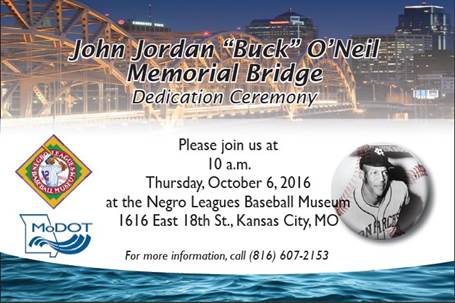
Now, for the first side of the long play album. The flip side will be played in about 10 days.
Theodore Roosevelt’s World Series: Theodore Roosevelt was in the White House for the first five World Series. He never attended a baseball game, and his daughter Alice said “Father and all us regarded baseball as a mollycoddle game. Tennis, football, lacrosse, boxing, polo, yes – they are violent, which appealed to us. But baseball? Father wouldn’t watch it, not even at Harvard.” This did not keep the political cartoonists from turning Teddy’s big stick into a bat. Here is TR wearing his Republican elephant uniform and batting against the donkey Democrats – the pitcher’s ball is “TRICKY POLITICS” being thrown at Teddy’s bat of “HONEST AND UPRIGHT GOVERNMENT.”
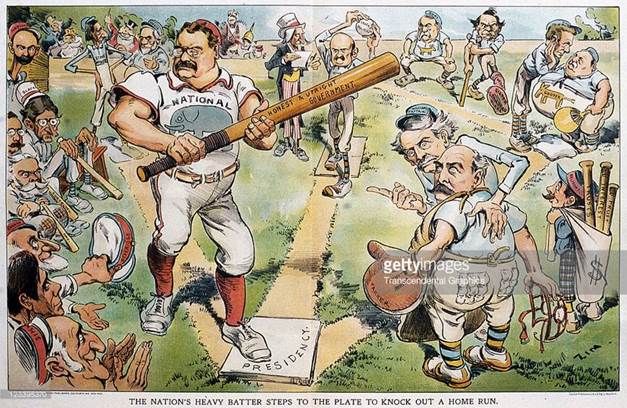
1903 – The first World Series pitted the Pittsburg (no “h” – see below) Pirates against the Boston Americans (not yet called the Red Sox). The Pirates had also won the NL pennant in 1901 and 1902. Boston won 5 games to 3 (the Series was the best of 9 games, a format repeated only in 1919, 1920 and 1921). Cy Young won two of the games for Boston.
1904 – The New York Giants won the NL pennant, but refused to play AL winner Boston because Boston played for a “junior” league. The leagues had no binding agreement to play each other, and the 1903 Series had been played by agreement of the two clubs. This was not popular with the fans and prompted the leagues to establish a rule that the pennant winners must play in the World Series. The only other missed year was 1994 because of a players’ strike.
1905 – The Giants again won the NL and beat Connie Mack’s Philadelphia Athletics, 4 games to 1. Christy Mathewson won three games for the Giants.
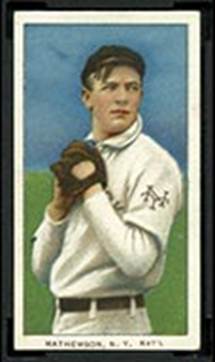
[Trivia Break: Christy Mathewson’s mother had wanted him to be a Methodist preacher, and he compromised by promising her that he would not pitch on Sundays. During the 1908 season, after the Giants lost a Sunday doubleheader in St. Louis, the New York press wondered if Mathewson should set aside his scruples to help the team. The problem was not as big as it might seem. The only cities that permitted Sunday baseball in 1908 were Chicago, St. Louis and Cincinnati. Other cities followed very slowly: Cleveland, Detroit and Washington (1918); NY (1919); Boston (1929); and Pittsburgh (with its “h” back) and Philadelphia (1934). Connie Mack of the Athletics fought a long battle to overturn the blue laws in Pennsylvania as his team struggled for profits while competing with the Phillies for fans.]
1906 – The Cubs record of 116-36 is still the best season in baseball history (Seattle won 116 in 2001, but the Mariners were playing in a season of 162 games and went 116-46.). In the first World Series played in one city, the Cubs were upset by their crosstown rival, the Chicago White Sox, 4 games to 2. Outside of NY, the only other single-city Series was in St. Louis in 1944.
1907 – The Cubs beat the Detroit Tigers in five games, but the Tigers won no games. The first game ended tied 3-3 in the 12th when it was called on account of darkness. The Cubs won the next four to take the Series with a record of 4-0-1.
1908 – The Cubs again beat the Tigers. Although both teams were very good, they each got to the World Series on a fluke. For the Cubs, it was a base running error. For the Tigers, a timely rainout.
The National League Matchup: From 1901 to 1913, every NL pennant was won by either the Cubs (4), Pirates (4) or Giants (5). Their 1908 rosters featured many future Hall of Famers.
Chicago Cubs: The pitching star was Mordecai “Three-Finger” Brown whose sinker ball was said to benefit from his loss of the use of two of his fingers in a farm accident. He won 29 games with an ERA of 1.47. The infield was the best during the decade: Manager Frank Chance was at first, Johnny Evers at second and Joe Tinker at shortstop. Many long-time fans know of this lament of a New York sportswriter: “These are the saddest of possible words – Tinker to Evers to Chance. Trio of Bear Cubs and fleeter than birds – Tinker to Evers to Chance.” Ed Ruelbach won 24 games, and two were shutouts in both ends of a doubleheader – the only major league pitcher to ever do that.
New York Giants: The Giants were symbolized by their manager, John “Little Napoleon” McGraw. Off the diamond, McGraw was known for being especially generous to the poor, but once he walked on to the field, his “great heart contracts to the dimensions of a bean.” McGraw held the record for most career ejections (132) until he was overtaken by Bobby Cox in 2007. All-time pitching great Christy Mathewson won 37 games with an ERA of 1.43. The right fielder was “Turkey Mike” Donlin, so named for his unique strut. Donlin made a run for the batting title and then took off the next two years to appear in a Broadway show with his wife. The Giants also had Joe “Iron Man” McGinnity who was in the last year of his Hall of Fame career. The back-up first baseman was rookie Fred Merkle. He is not in the Hall of Fame.
Pittsburg Pirates: The best player of the decade was a Pirate – shortstop Honus Wagner. In 1908, he beat out Turkey Mike Donlin for the batting title, one of his eight seasons leading the NL in hitting. He is probably more well known today for his Series T206 baseball card that was sold in 2007 for $2.7 million.
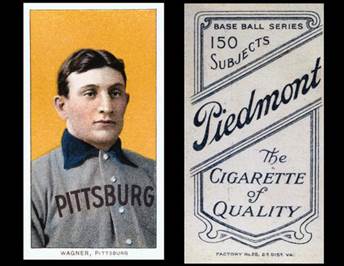
The Umpires: The games had only one or two umpires which led to many “umperical” errors. The National League had two of the best and they are in the Hall of Fame. Bill Klem is considered to be the “father of baseball umpires” and worked in the majors from 1905 to 1941. Hank O’Day umpired for 30 years, including 10 World Series, second only to Klem’s 18. He umpired five of the first seven Series and was behind the plate for the first Series game in 1903. He was well respected and one NY reporter in 1908 wrote “O’Day makes mistakes, of course, but when one thinks of all that an umpire must go through during a baseball season one feels like giving a medal to good old Hank O’Day.”
The National League Pennant Race (Before Merkle): The three teams were closely matched and kept exchanging first, second and third place as the season unfolded. Although not obvious at the time, a key game took place on September 4. The Cubs and Pirates were scoreless in the last of the tenth, bases loaded with two outs. The next Pittsburg batter hit the ball into short center and the runner on third scored the winning run. The runner on first ran toward second, but presuming that the game was over, never went on to second. The sole umpire, Hank O’Day, made the same presumption and left for the exit as Pittsburg’s happy fans invaded the field. Cubs’ second baseman Johnny Evers called for the ball from the outfield and then touched second base, claiming a force out to end the inning and nullify the run. Without O’Day present, there was no one to call the out, so the game ended 1-0. Chicago filed a protest with affidavits of what happened. League President Harry Pulliam ruled against Chicago because the umpire had not seen the sequence of events. As reported in The Sporting News, “It is a baseball axiom that only that which the umpire sees occurs on a field.” A Pittsburg paper noted that players would no doubt be more careful in the future since the umpire might be present and call the out. An argument was also made that this was more proof that all games should have a double-umpire system.
The pennant race stayed tight. On September 18, the Giants beat the Pirates in both games of a doubleheader, and the games were a national event. As reported in the New York American, “It is doubtful if during the [civil] war so many people throughout the entire nation watched bulletins so anxiously. Then they waited to hear if Chancellorsville, Gettysburg or Antietam had been lost or won, whether a father, brother or son had died on the field of battle. Yesterday the nation quivered and shook while 18 young men, most of whom will soon be quietly farming or running a café, played two games of baseball…What the Giants did yesterday made a man forget grocer, butcher and undertaker bills.”
As of September 20, the Giants led the Cubs by 3½ games and Pittsburg by 4. To accommodate more fans for the expected World Series, contracts were signed to add 7,000 seats to the Polo Grounds. The next day, the Giants lost to the Pirates after umpire Hank O’Day called a player safe at first when he appeared to all others to be easily out (shades of Don Denkinger in 1985). John McGraw protested vigorously to the other umpire, Bill Klem, and Klem kicked him out. A NY sportswriter put it to verse: “When you made that rank decision, When the thousands voiced derision, Where in Hades was your vision, Hank O’Day.” Things got worse the next day when the Giants lost a doubleheader at home to the Cubs. An analysis from a Chicago sportswriter: “The race is still of the closest, fiercest pattern, and no prophet ever prophed who could foretell the finish.”
Merkle’s “Bonehead” Play: On September 23, the Cubs and Giants again played at the Polo Grounds. The umpires were Hank O’Day and Bob Emslie. Fred Tenney of the Giants was injured and so his backup, 19-year old Fred Merkle, made his first start of the year at first base. In the bottom of the 9th, Christy Mathewson and Jack Pfiester were locked in a pitching duel with the score at 1-1. With two out and Moose McCormick on first, Merkle got a timely hit to move McCormick to third. Al Bridwell came up and shot a single to center for a walk-off win for the Giants. Or not. Merkle got partway to second and assumed the game was over and headed for his dugout to escape the horde of Giants fans coming out of the stands.
Three people on the field were quite familiar with this scenario from the September 4 Cubs/Pirates game – umpire Hank O’Day, Cubs second baseman Johnny Evers and Cubs center fielder Artie Hoffman. Evers called for the ball so he could step on second and nullify the run and put the game into extra innings. Hoffman, instead of running into the dugout as most might have done, quickly went to the ball and threw it back in. There are many versions of how Evers got the ball: it was thrown wildly back by Hoffman and may have been intercepted by Joe McGinnity who was coaching third for the Giants; he may have thrown it into the stands and the Cubs players fought fans for the ball; or another ball was brought into the mix. The end result is that Evers got a ball, stepped on second and although fans were all over the field, Hank O’Day called Merkle out. O’Day had been behind the plate, but based on his prior experience, went on to the field to see if there would be a play at second. The other umpire (Emslie) was busy making sure the batter touched first.
O’Day and Evers were surrounded by the riotous crowd and police arrived to escort them off the field. The umpires did not try to go to extra innings as they could not quickly remove the fans and the sun was going down. This meant the game ended in a 1-1 tie. New York protested the decision, and League President Pulliam agonized over the controversy and took a week to issue his ruling. Pulliam was consistent with his handling of the earlier Pirates/Cubs game with similar facts – he would rely on the what the umpire saw, and this time O’Day had seen the force out. Pulliam did not accept that it was baseball custom that everyone could exit the field after the run crosses the plate – force outs could still nullify the run. He said “O’Day is no novice, and there is no reason to doubt his accuracy in his decision. As an umpire, he ranks second to none; his integrity has never been questioned.” The game was not rescheduled because there were no mutual open dates left in the season. O’Day’s decision was not made until October 2, and it was appealed to the league’s board of directors. The board was also slow, waiting to announce its decision on October 6, the day before the season ended. O’Day, Pulliam and the board all agreed. Merkle was out.
Merkle’s failure to touch second was called a “bonehead” play by some in the press, and “Merkle’s Boner” became the shorthand for describing the game (has its own Wikipedia page). Some in the New York press were vicious in condemning him. Others blamed McGraw for failing to better coach his players, especially after the ruling in the September 4 game that raised the issue but without the umpire seeing the play. The young Merkle was really just following the lax custom of the day after a “Sudden Death” hit. Although no camera was following Merkle on the play, there is video of the hit and the almost-run crossing the plate, followed by the fans pouring on to the field (5 minutes – click here).
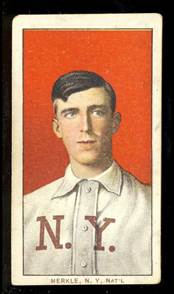
The National League Pennant Race (After Merkle): After the Merkle game, the Giants led the Cubs by percentage points and they were both one game ahead of Pittsburg. With the final Merkle decision hanging over their head, the teams all finished strongly: the Pirates went 9-2, the Cubs 8-2 and the Giants 11-5. This left the Cubs and Giants tied at 98-55 with the Pirates a half game back at 98-56. The Giants and Cubs had played one less game because the tie in the Merkle game did not count in the standings. The only solution was to replay that game to determine the pennant winner. The teams returned to the Polo Grounds on October 8. The papers claimed that from 100,000 to 250,000 fans tried to get in, but only 40,000 would fit. Many of the rest went to Coogan’s Bluff or climbed up on roofs and telephone poles. So many watched from the elevated train tracks that the 155th Street train line could not run that day.
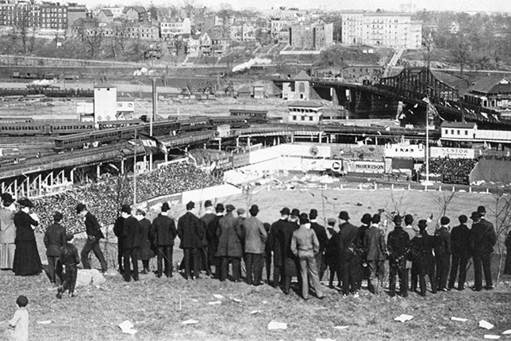
The pitching starters for the playoff game were the same as those in the Merkle game. Christy Mathewson told McGraw that he did not have his top stuff, but McGraw insisted on starting his best pitcher. The Cubs countered with Jack Pfiester, but after Pfiester gave up a run in the first, they also went to their best pitcher, Mordecai Three-Finger Brown. Mathewson turned out to be right about his stuff and gave up four runs in the third. The Cubs won 4-2 and then ran for their lives as the furious fans descended, many feeling they were cheated by the league on the Merkle ruling. Several Cubs were beaten up and manager Frank Chance was hit in the throat with a bottle and could not speak for two days. But the Cubs were on their way to the World Series for a rematch with Detroit.
| National League | ||||
| Club | Wins | Losses | Win % | GB |
| Chicago Cubs | 99 | 55 | .643 | – |
| New York Giants | 98 | 56 | .636 | 1.0 |
| Pittsburg Pirates | 98 | 56 | .636 | 1.0 |
| Philadelphia Phillies | 83 | 71 | .539 | 16.0 |
| Cincinnati Reds | 73 | 81 | .474 | 26.0 |
| Boston Doves | 63 | 91 | .409 | 36.0 |
| Brooklyn Superbas | 53 | 101 | .344 | 46.0 |
| St. Louis Cardinals | 49 | 105 | .318 | 50.0 |
[Trivia from the standings above: Brooklyn became the Dodgers in 1932 and Boston the Braves in 1912 (but were called the Bees from 1936 to 1940). Pittsburgh, with an “h” at the end, was long the traditional spelling for the city. In 1891, as part of a an effort to standardize all city names, a Federal geographic naming agency took the “h” out of all cities that ended in “burgh”. That is why it is “Pittsburg” in the standings and on the Honus Wagner baseball card (see above). The city and baseball team got their “h” back in 1911.]
[More trivia: Merkle played 10 years with the Giants (1907-1916) and his last four seasons (1917-1920) with the ….Cubs! Umpire Hank O’Day broke up his umpiring career two times to be a manager. In 1912, he managed the Reds and in 1914, he managed the….Cubs! Hank is shown below as Cubs manager.]
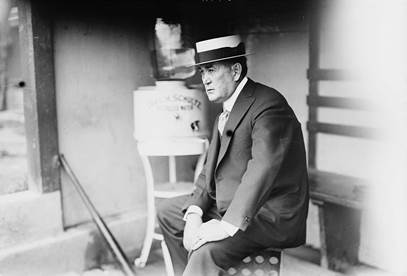
American League Pennant Race of 1908: Believe it or not, the 1908 American League race was tighter than the NL. Detroit won by a half-game. That story will be in Part Two (Hot Stove #26) which will also take us to the 1908 World Series, the last time the Cubs won it all.
It’s Déjà Vu All Over Again: Thanks Yogi. Last night, the Cardinals and Reds were tied in the bottom of the ninth, man on first, two outs. Molina hit a looping liner to left. The runner scored from first and the Cardinals rushed the field to celebrate. The TV announcer said it looked like the ball bounced and hit the lottery sign above the outfield fence and might be a ground-rule double. This would mean that the scoring runner would have to return to third. The umpires, not getting an “immediate” request for a replay from the Reds, left the field. The replay clearly shows that it was a ground-rule double. You could say the Cardinals won the lottery.
The Reds think they were not given a proper opportunity to request the replay. This reminds me of the September 4 game where O’Day did not see the runner fail to get to second after O’Day hurried off the field as the fans descended. So, even in these days of replay, the axiom can still apply, “only that which the umpire sees occurs on the field.” How important is this? The Cards are one game away from San Francisco for a wild-card spot. Two games would have been a safer lead for the Giants who play the tough Dodgers this weekend. The good news is that we can now move on from Don Denkinger in 1985 to the umpiring crew from last night’s game – they refused to come back out on the field to even discuss the issue. Karma for the Cards, 31 years later.